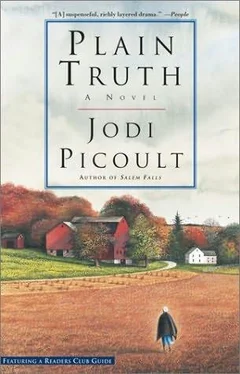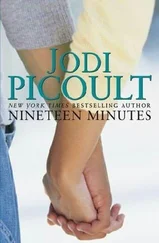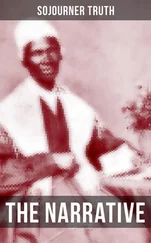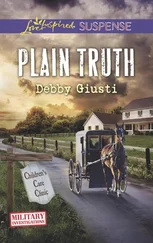I had been there long enough to know that wasn’t quite right. You were always welcomed back-you just had to admit to your sins. “Actually, she could confess, and go back to the church.”
“Unfortunately, just because others would forgive her doesn’t mean that she would forget. She’d be carrying that around for the rest of her life.” Coop turned to me. “Given her upbringing, it’s not surprising that her mind is working overtime to block out what’s happened.”
I flopped onto my back beside him. “She tells me she didn’t kill the baby. She tells me she didn’t have the baby. But there’s proof that she did have the baby-”
“And if she lied about the one thing,” Coop finished for me, “then she’s probably lied about the other. However, lying presumes conscious knowledge. If she’s dissociating, she can’t be blamed for not knowing the truth.”
Coming up on my elbow, I smiled sadly. “But can she be blamed for committing murder?”
“That,” Coop said, “depends on a jury.” He tugged me upright. “I’d like to keep talking to her. Walk her through the night before the birth.”
“Oh, you don’t have to do that. I mean, it’s incredibly nice of you and far beyond the call of duty, but you must have more important things to do.”
“I said I’d help you, El, and I haven’t exactly done a crackerjack job yet. I’ll drive out in the evenings and talk to her after leaving the office.”
“And meanwhile, your wife’s sitting home eating dinner alone. Weren’t you the one who told me psychiatrists are the ones who can’t keep their own personal relationships together?”
Coop nodded. “Yeah. Which is probably why I got divorced about a year ago.”
I turned toward him, my mouth dry. “You did?” He looked down at his shoes, at the rush of the creek; and I wondered why it was so easy to speak of Katie, and so difficult to speak of ourselves. “Coop, I’m sorry.”
He reached out to the bark of a tree and plucked off a neon inch-worm, which curled tight as a drum in the hollow of his palm. “We all make mistakes,” Coop said softly. He reached for my hand and held it up beside his, just as the worm began to move; traveling, stretching, a small bright bridge between us.
It took me a half hour to convince Sarah that if I left Katie in her custody for the morning, I wouldn’t be breaking any laws, and chances were incredibly slim that any representative of the court would come ambling by to realize I wasn’t around. “Look,” I said finally, “if you want me to gather up a defense strategy for Katie, I need flexibility.”
“Dr. Cooper drove out here,” Sarah fretted.
“Dr. Cooper doesn’t have to bring half a million dollars’ worth of laboratory equipment with him,” I explained. In fact, I had worked so hard just to guarantee myself the two hours I needed to meet with Dr. Owen Zeigler that I was faintly disappointed to realize I had no desire to be in the neonatal pathology lab at the University of Pennsylvania Medical Center. I kept thinking of sick infants, dead infants, infants born at risk to women over forty, and all I wanted to do was hightail it back to the Fishers’ farm.
Owen, a man with whom I’d worked once in the past, had a Moon Pie face, a bright bald head, and a round middle that balanced on his knees whenever he hiked himself up onto one of the high stools in front of the microscopes. “The placental culture showed mixed flora, including diphtheroids,” he said. “Which basically means there was crap floating around.”
“Are you saying it might have affected the results?”
“No. It’s perfectly normal, considering the placenta had been lying around in a barn.”
I narrowed my eyes. “Then tell me something that’s abnormal.”
“Well, the death of the neonate. Looks like a live birth to me,” he said, and my hopes plummeted. “Based on the hydrostatic test, air made it to the alveoli.”
“Speak English, Owen.”
The pathologist sighed. “The baby breathed.”
“That’s a definite, then?”
“You can tell if a newborn, even a preemie, has breathed air or just inhaled fluid, when you look at the alveoli in the lungs. They get rounded. It’s more conclusive than the hydrostatic test itself, because lungs may float if artificial respiration was attempted.”
“Yeah, right,” I muttered. “She gave it mouth to mouth, and then killed it.”
“You never know,” Owen said.
“So what made it stop breathing?”
“The medical examiner is crying suffocation. But that’s not conclusive.”
I climbed onto a stool beside the pathologist. “Tell me more.”
“There are petechiae in the lungs, which suggests asphyxia, but they could have formed before or after death. As for the bruising on the neonate’s lips, all that means is that it was pressed up tightly against something. That something could have been the mother’s collarbone, for all we know. In fact, if the newborn was suffocated with something soft, like the shirt it was wrapped in or the mother’s hand, the findings are virtually indistinguishable from SIDS.”
He reached forward and took from my hand the glass slide I’d been absently playing with. “Bottom line: the baby could very well have died without anyone laying a hand on him. At thirty-two weeks, it’s a viable neonate, but just barely.”
I frowned. “Would the mother have known if the baby was dying right before her eyes?”
“Depends. If it was choking on mucus, she could have heard it. If it was suffocating, she’d see it gasping, turning blue.” He turned off his microscope and slipped the slide-marked clearly BABY FISHER-into a small box containing others.
I tried to imagine Katie paralyzed by fear, by the awareness of this tiny premature infant struggling to breathe. I pictured her watching it, wide-eyed, too stunned to intervene; and then realizing too late what had happened. I saw her wrapping it in a shirt and trying to hide it, before anyone could discover what had gone wrong.
I envisioned her standing in a court of law, still, on trial for failing to seek proper medical attention after delivering the baby. Negligent homicide-not first-degree murder. But a felony, nonetheless; one that carried with it a jail sentence.
Extending my hand to Owen, I smiled. “Thanks anyway,” I said.
On Saturday night, I headed upstairs at about ten o’clock and drew the green shades on the eastern side of the room. I took a shower and thought of Coop, wondered what he might be doing-seeing a movie? Eating out at a five-star restaurant? I was wondering if he still wore a T-shirt and boxers to bed when Katie came into the room. “What’s the matter with you?” she asked, peering at my face.
“Nothing.”
Katie shrugged, then yawned. “Boy, I’m tired,” she said, but her bright eyes and the bounce in her step completely contradicted her words. As she walked into the bathroom, I turned off the bedroom light and crawled into bed, letting my eyes adjust to the darkness. Katie returned, sat down on the edge of her bed, and took off her boots. Then she slid between the sheets, fully dressed.
I came up on an elbow, amused. “Aren’t you forgetting something?”
“I’m cold, is all.”
“There’s another quilt in the closet, up on top.” I thought of her rolling over in the middle of the night and having one of the pins that secured her dress jab her chest.
“This is fine.”
“Suit yourself.” I rolled over, staring at the wall, and suddenly remembered being sixteen years old and going to sleep in all my clothes, so that I could sneak out of the house when I saw the headlights of my best friend’s car and go to the party a football jock was throwing while his parents were out of town. Sitting up, I glared at Katie’s huddled body. “Where are you planning on going?”
Читать дальше












